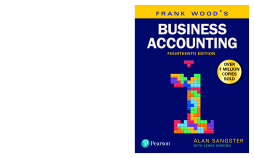
Additional Information
Book Details
Abstract
Frank Wood’s Business Accounting Volume 1, the world’s bestselling textbook on book-keeping and accounting, continues to provide an indispensable introduction for students and professionals across the globe.
Now celebrating more than 50 years in publication, the 14th edition has retained all the essence of what makes this the go-to textbook for accounting and book-keeping, but has also undergone significant changes and revisions based on reviewer feedback. With the inclusion of brand new chapters such as ‘Maths for Accounting’, combined with the reorganisation of chapters, and revision of end-of-chapter questions, this book will provide all the support you will need for learning key accounting topics.
New to this Edition
· Maths for Accounting chapter
· Part 6 ‘Checks and Errors’
· Incorporation of new end-of-chapter questions
· Accounting Today chapter
For lecturers, visit www.pearsoned.co.uk/wood for our suite of resources to accompany this textbook, including:
· A complete solutions guide
· PowerPoint slides for each chapter
· Seven online chapters for further reading
MyLab Accounting
Join over 10 million students benefiting from Pearson MyLabs.
This title can be supported by MyLab Accounting, an online homework and tutorial system designed to test and build your understanding. Alan Sangster is Professor of Accounting at the University of Sussex and formerly at other universities in the UK, Brazil, and Australia.
Lewis Gordon is Lecturer in Accounting at the University of Liverpool, and has extensive experience of teaching financial accounting at undergraduate and professional levels.
Frank Wood formerly authored this text and he remains one of the best-selling authors of accounting textbooks.
Table of Contents
| Section Title | Page | Action | Price |
|---|---|---|---|
| Front Cover | Front Cover | ||
| Half Title Page | i | ||
| Title Page | iii | ||
| Copyright Page | iv | ||
| Contents | v | ||
| Notes for teachers and lecturers | viii | ||
| Notes for students | xi | ||
| The Last Lecture | xxi | ||
| Publisher’s acknowledgements | xxii | ||
| Part 1 Introduction to financial accounting | 1 | ||
| Chapter 1 The background and the main features of financial accounting | 3 | ||
| Chapter 2 Recording transactions | 21 | ||
| Chapter 3 Inventory | 44 | ||
| Chapter 4 The effect of profit or loss on capital and the double entry system \nfor expenses and revenues | 55 | ||
| Chapter 5 Balancing-off accounts | 68 | ||
| Chapter 6 The trial balance | 77 | ||
| Chapter 7 Accounting concepts and assumptions | 90 | ||
| Part 2 Books and transactions | 105 | ||
| Chapter 8 Books of original entry and ledgers | 107 | ||
| Chapter 9 Cash books | 113 | ||
| Chapter 10 The analytical petty cash book and the imprest system | 127 | ||
| Chapter 11 Accounting for sales, purchases and returns | 135 | ||
| Chapter 12 The journal | 160 | ||
| Chapter 13 Value added tax (VAT) | 171 | ||
| Part 3 Financial statements | 185 | ||
| Chapter 14 Income statements | 187 | ||
| Chapter 15 Balance sheets | 199 | ||
| Chapter 16 Income statements and balance sheets: further considerations | 207 | ||
| Chapter 17 Capital expenditure and revenue expenditure | 224 | ||
| Chapter 18 Inventory valuation | 233 | ||
| Part 4 Accounting today | 249 | ||
| Chapter 19 Accounting today | 251 | ||
| Part 5 Adjustments for financial statements | 269 | ||
| Chapter 20 Bad debts, allowances for doubtful debts and provisions for discounts on \naccounts receivable | 271 | ||
| Chapter 21 Depreciation | 286 | ||
| Chapter 22 Accruals and prepayments | 318 | ||
| Part 6 Checks and errors | 343 | ||
| Chapter 23 Control accounts | 345 | ||
| Chapter 24 Bank reconciliations | 361 | ||
| Chapter 25 Statements of cash flows | 375 | ||
| Chapter 26 Errors not affecting the balancing of the trial balance | 393 | ||
| Chapter 27 Suspense accounts and errors | 401 | ||
| Part 7 Special accounting procedures | 423 | ||
| Chapter 28 Receipts and payments accounts and income and expenditure accounts | 425 | ||
| Chapter 29 Manufacturing accounts | 437 | ||
| Chapter 30 Departmental accounts | 455 | ||
| Chapter 31 Joint ventures | 464 | ||
| Part 8 Partnership accounts and company accounts | 475 | ||
| Chapter 32 Partnerships | 477 | ||
| Chapter 33 Goodwill for sole proprietors and partnerships | 496 | ||
| Chapter 34 Revaluation of partnership assets | 512 | ||
| Chapter 35 Partnership dissolution | 520 | ||
| Chapter 36 Company accounts | 541 | ||
| Chapter 37 Purchase of existing partnership and sole proprietor businesses | 573 | ||
| Part 9 An introduction to financial analysis | 587 | ||
| Chapter 38 Maths for accounting | 589 | ||
| Chapter 39 Accounting ratios | 604 | ||
| Chapter 40 Single entry and incomplete records | 616 | ||
| Chapter 41 Analysis and interpretation of financial statements | 636 | ||
| part 10 An introduction to management accounting | 669 | ||
| Chapter 42 An introduction to management accounting | 671 | ||
| Appendices | 683 | ||
| Appendix 1 Answers to review questions | 683 | ||
| Appendix 2 Answers to multiple choice questions | 763 | ||
| Appendix 3 Glossary | 764 | ||
| Index | 774 | ||
| Back Cover | Back Cover |
